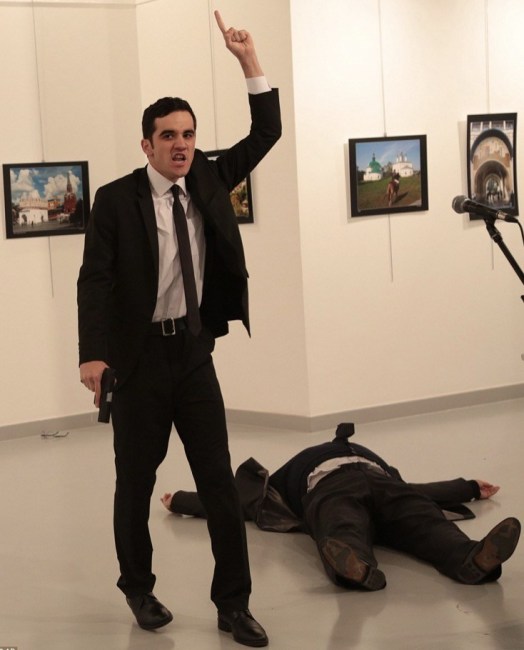By Abdullah Bozkurt
A Turkish al-Qaeda-linked operative who worked as a handler for the killer of Russian Ambassador Andrei Karlov in 2016 turns out to have been on the Turkish government payroll as a cleric attached to the Directorate of Religious Affairs (Diyanet) since 2011, while his elder brother was also working for the Diyanet as a mufti in a district of Ankara, Nordic Monitor has found out.
İbrahim Bilal Oduncu, a 35-year-old jihadist figure who had worked with the assassin, Mevlüt Mert Altıntaş, has been serving as muezzin (deputy imam) at Ankara’s Gimat Mosque, according to the indictment in the Karlov case. The investigation determined that as of January 2017 he was still receiving a salary from the government under the budget allocated to the Yenimahalle district Mufti Administration. A flurry of contacts, both in person and over the phone, between Bilal and the 22-year-old riot police officer who gunned down the Russian envoy in December 2016 were revealed.

Furthermore, according to an investigation report prepared by the Financial Crimes Investigation Board (MASAK), the Russian ambassador’s killer wired funds to Bilal on Nov. 7, 2015 and July 7, 2016 for a total of TL 1,100. A day before he killed the Russian ambassador, Altıntaş called Bilal and told him he had a collection of religious books including jihadist materials written by leading al-Qaeda ideologues and wanted to donate them for the use of others because he was reassigned to a post in Diyarbakir and had to move.

Bilal gave three separate statements to authorities on Dec. 21, 2016, May 25, 2017 and Jan. 3, 2018, meaning that he had to respond to additional questions as the probe revealed more details about the extent of his contact with the killer. Yet the Turkish prosecutor did not conclude that he should be tried as a suspect or accomplice in the case but rather listed him as a witness. It is obvious that he was protected from criminal charges by people in the government who were watching out for him.
Nordic Monitor identified Bilal and his brother Murat Oduncu as individuals who have for some time been leading a Turkish al-Qaeda-affiliated front NGO that is operational in Turkey’s capital of Ankara with the protection of President Recep Tayyip Erdoğan’s government. Both of them were in contact with the killer and involved in activities to support jihadists in Syria. Another brother, Metin Ali Oduncu, who is also a district mufti working for the Diyanet, and his son Muhammed Selman Oduncu were involved with the killer to varying degrees.

The NGO’s name is the Hamra Organization for Humanitarian Relief and Religious Research (Hamra İlmi Araştırma ve İnsani Yardımlaşma Derneği), which was established and run by the Oduncu brothers. The Cordoba Youth Movement (Kurtuba Gençlik Hareketi) is the youth wing of Hamra and has been active in recruiting Turkish jihadists for the war in Syria, raising funds and procuring logistical supplies for their brethren there. The Oduncu brothers also run operations on behalf of two other Islamist NGOs, namely İhsan ve Hizmet Derneği and Paylaş Uluslararası İnsani Yardım Derneği. The former mainly focuses on the dissemination of jihadist literature, while the latter is involved in charity work.

The assassin Altıntaş reached out to Bilal through Murat, the elder brother, over the Internet, and the two later met at Murat’s store, called Ünal Market. A friendship developed from there. Bilal later met Altıntaş three to four times and one time even invited him to his home for a talk. The conversation between the two mainly focused on Syria, and Altıntaş expressed his desire to leave the police force and go to Syria for jihad. The killer also attended Quran lessons delivered by Bilal in the Hicret Mosque in Ankara’s Etlik district. Altıntaş was part of a WhatsApp group set up by Bilal to communicate with the cell’s other members.

On Dec. 18, 2016 Altıntaş posted a message in the WhatsApp group asking if anybody was interested in taking his books as he was moving from Ankara. Bilal replied and said he could drop the books at his brother Murat’s store and that he would pick them up from there. Altıntaş brought the books in a suitcase and left them for Bilal in his brother’s store. When Altıntaş arrived at the store, Muhammed Selman was working at the market and took delivery of the books.

According to a report dated Sept. 21, 2018 and incorporated in the indictment, Altıntaş possessed several jihadist books written by Bülent Tokgöz, who used the assumed name of Yahya Konuk in his writings. Tokgöz is a battle-hardened, long-time jihadist who travelled to Chechnya, Bosnia and Kashmir in the 1990s. He was arrested along with five other Turkish nationals on Jan. 31, 2001 as part of a crackdown on radical religious groups. Tokgöz and his friends (İzzettin Tunç, Talip Kara, Burhan Kavuncu and two businessmen identified only by their first names, Halil and Salim) were responsible for planting bombs in front of the Russian Consulate General in Istanbul on Nov. 15, 1999 and at Russia’s Aeroflot ticket office in the Beyoğlu district of the same city on Dec. 8, 1999. Therefore, it is not surprising that Karlov’s assassin was inspired by Tokgöz, who had taken part in terrorist acts against Russian interests in the past. Tokgöz remains at large today and is believed to be in conflict zones outside of Turkey.



In the summer 2015 Murat Oduncu arranged a meeting with the assassin and Tokgöz’s cleric, Mehmet Emin Akın, a Turkish Salafist cleric who runs an Islamist NGO called Merhamet Eğitim ve Kültür Derneği (Mercy Education and Culture Association) in Ankara. Akın was detained by police in May 2017 as part of an Islamic State in Iraq and the Levant (ISIL) probe but was quickly released after the Erdoğan government’s intervention amid an outcry from his own supporters. Interestingly enough, Akın’s website published a letter he had received from the jailed Tokgöz, whose books inspired the Russian ambassador’s assassin. The letter was sent to Akın on March 22, 2002, when Tokgöz was serving time in a prison in central Eskisehir province. Akın addressed the jihadist Tokgöz as “brother,” while the latter called the former Aziz Ağabeyim ve Hocam (Respected Elder Brother and My Preacher).
In other words, both the man who tried to blow up the Russian Consulate with 35 kilograms of explosives in 1999 and the man who killed the Russian ambassador in 2016 had the same master. The Turkish prosecutor also ignored this link and did not pursue any probe into Altıntaş’s contacts with the cleric Akın. What Tokgöz failed to accomplish in taking down a high-profile Russian target in Turkey was accomplished by Altıntaş, who read Tokgöz’s jihadist books. Akın, who met killer and talked to him in person, was not named as a suspect, either. He testified as a witness.




Jihadist books owned by the killer of the Russian ambassador.
Another book the assassin had was popular jihadist reading material about Syria and resistance groups there written by Abdülkadir Şen, who was a suspect in a 2014 al-Qaeda probe in Turkey. Şen was exposed while moving supplies to jihadist groups in Syria, but the investigation, which also uncovered Turkey’s National Intelligence Organization’s (MIT) close cooperation with al-Qaeda groups in Syria, was quickly hushed up by the Erdoğan government. In the same case file Abdülkadir’s brother, İbrahim Şen, a convicted al-Qaeda terrorist who was running a recruitment and trafficking scheme between Turkey and Syria, was also a suspect. İbrahim Şen was detained in Pakistan on alleged al-Qaeda links and transferred to Guantanamo, where he was kept until 2005, when US officials decided to turn him over to Turkey. He was arrested in January 2014 and indicted in October 2014 but let go at the first hearing of the trial in October 2014. His brother Abdülkadir also escaped criminal charges thanks to political cover provided by Erdoğan. He was not named as a suspect in the Karlov case, either, even though Abdülkadir met the killer in person and talked to him.

Other books the Russian ambassador’s killer handed over to his contact in Ankara included translated volumes written by Abu Yahya al-Libi, one of the most senior figures in al-Qaeda who was killed in June 2012 in a drone attack in Pakistan, and Anwar al-Awlaki, known as the father of global jihad and a founding member of al-Qaeda who was killed in 1989 in Pakistan. Incidentally, these and many other jihadist books are freely sold in Turkey, while numerous publications critical of the Erdoğan government are banned and collected from bookshelves. In some cases even the publishing houses are unlawfully seized. It says a great deal about the approach of the Turkish government when it comes to violent jihadist literature.

In his testimony to the police, 26-year-old Muhammet Selman said his uncles went to the border province of Hatay on the night of Dec. 13, 2016 to attend a program organized by the Foundation for Human Rights and Freedoms and Humanitarian Relief (İnsan Hak ve Hürriyetleri ve İnsani Yardım Vakfı, or IHH) and came back few days later. The IHH was named by Russia as a front outfit that sends arms and supplies to jihadist groups in Syria with the help of the Erdoğan government. The intelligence documents attesting to that fact were submitted to the UN Security Council by Russian Ambassador Vitaly Churkin in January 2016. When the killer went to drop off the books, Selman was minding the store. He said his uncles had some business to attend to on Dec. 18, 2016 and that they had asked him to take care of the shop in their absence.

The Oduncu brothers shut down their social media accounts after the murder of the Russian ambassador and tried to cover their tracks, but there was overwhelming evidence already recorded to suggest that they are a dangerous gang bent on radicalizing more people like the assassin policeman. On the night of a false flag coup attempt on July 15, 2016 the Oduncu brothers were one of the jihadist groups that mobilized in the streets of Ankara. They were among the crowd in front of Ankara police headquarters where they were given MP-5 machine guns. A video recording I managed to find shows them preaching and distributing jihadist materials in front of Erdoğan’s palace in Ankara, while Murat Oduncu was waving a black and white jihadist flag. As of today, they continue to act with impunity from a base of operations in an Ankara neighborhood where the Turkish intelligence agency’s headquarters are located.

Mufti Metin Oduncu, a 54-year-old cleric who is on the government payroll and responsible for many Imams and mosques in the Güldül district of Ankara, also testified as a witness in the Karlov murder trial. Police brought him in for questioning at the counterterrorism department on Dec. 21, 2016. He claimed his brothers were innocent and framed by the killer. Metin Oduncu served as a Diyanet imam in Oslo, Norway, between 2003 and 2007. He has been working for the government as a mufti since September 2014.



Above are seen Kurtuba youth movement posters on the Internet that show how they praise Osama bin Laden, condemn Erdogan’s chief critic, the US-based Muslim scholar Fethullah Gülen, and run an operation to send pickup trucks to jihadists in Syria.
Source: Nordic Monitor



